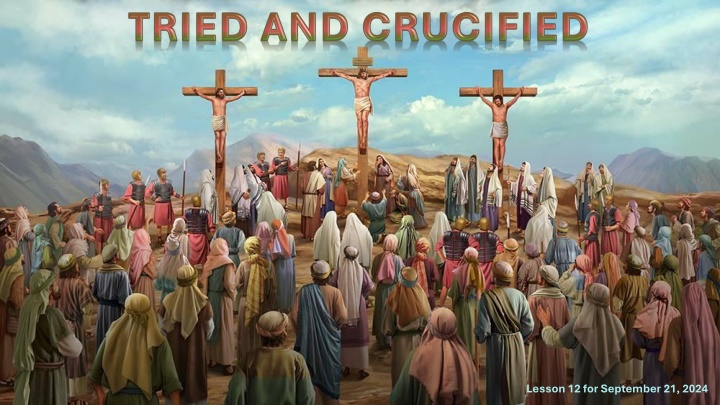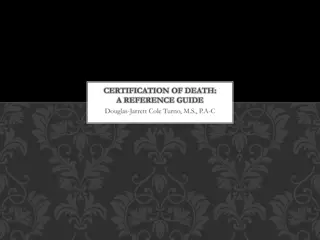The Ironies of Jesus' Death
The death of Jesus was marked by ironies as both Jews and pagans declared Him King in disbelief. Pontius Pilate, while acknowledging no crime in Jesus, succumbed to pressures in authorizing His death. Despite the mockery and cruelty inflicted upon Him, some ended up recognizing Jesus as the true Son of God, unknowingly paying tribute to their rightful King.
Uploaded on Mar 06, 2025 | 0 Views
Download Presentation

Please find below an Image/Link to download the presentation.
The content on the website is provided AS IS for your information and personal use only. It may not be sold, licensed, or shared on other websites without obtaining consent from the author.If you encounter any issues during the download, it is possible that the publisher has removed the file from their server.
You are allowed to download the files provided on this website for personal or commercial use, subject to the condition that they are used lawfully. All files are the property of their respective owners.
The content on the website is provided AS IS for your information and personal use only. It may not be sold, licensed, or shared on other websites without obtaining consent from the author.
E N D
Presentation Transcript
And at the ninth hour Jesus cried out with a loud voice, saying, Eloi, Eloi, lama sabachthani? which is translated, My God, My God, why have You forsaken Me? (Mark 15:34, NKJV)
The death of Jesus was surrounded by ironies: Pagans and Jews alike declare Him King ; however, none of them really believe it is. While the Jews think that Jesus calls out to Elijah as he cries out to his Father, a pagan soldier declares him the Son of God. A member who belonged to the council that declared Jesus guilty of death offers his own tomb so that Jesus, who was born in a stable, can be buried as a nobleman.
Pontius Pilate was the Roman official who had to authorize the death of Jesus. Everyone knew of his cruelty and unscrupulousness (Luke 13:1). However, he publicly acknowledged: I find no crime in him (Jn . 18:38). The Sanhedrin's plan seemed doomed to failure. They had found Jesus guilty of blasphemy for declaring himself the Messiah (Mark 14:61-64). Since the Messiah was destined to be the King of Israel, that was the accusation they presented before Pilate. Jesus neither denied nor accepted the accusation, but he made it clear to Pilate that he did not aspire to rule an earthly kingdom (Mark 15:2; John 8:33-37). Pilate used this accusation to mock the Jewish leaders: Do you want me to kill your king? However, he capitulated before them by punishing Jesus and freeing a real evildoer (Mark 15:8-15).
They put a purple robe on him, then twisted together a crown of thorns and set it on him. And they began to call out to him, Hail, king of the Jews!! (Mark 15:17-18) Before being crucified, the prisoners were stripped naked and subjected to a cruel flogging. One or more soldiers hit the prisoner's back with a whip intended to tear the flesh. It wasn't 39 lashes, like the Jews gave. The soldier beat until he was tired. Knowing the accusation against Jesus, the soldiers decided to carry out a parody to ridicule him. They placed a crown on him, put a royal mantle on him, gave him a scepter, sat him on a throne, and made obeisances to him as if he were Caesar (Mark 15:17-19; Mt. 27:28-29). For them it was a game. A cruel game. Although they could not see a king in Jesus, some ended up recognizing him as the Son of God. Without knowing it, they were paying tribute to their true King.
THE CROWD CALLS JESUS KING OF ISRAEL Exhausted by fasting and scourging, Jesus was unable to carry his own cross. A compassionate foreigner was forced to carry it in his place (Mark 15:21). Like a lamb being led to the slaughterhouse, Jesus, without any complaint, allowed himself to be led to Calvary; they would undress him; they placed him on the cross; They will nail their hands and feet; and they would lift him up high. As an act of mercy, a soldier offered him a drug to cloud his mind. But Jesus rejected this gesture. He would not let anything prevent him from consciously and voluntarily surrendering to the redemptive act (Mark 15:23). Once again, he was the victim of ridicule. Like the soldiers, the Jews ironically recognized Jesus as the Messiah. They accepted that He was able to save (Mark 15:31), and seemed willing to believe in Him if He saved Himself (Mark 15:32). But, if Jesus was saved, both they and we would be condemned (Mark 15:30).
THE CENTURION DECLARES JESUS SON OF GOD And when the centurion, who stood there in front of Jesus, saw how he died, he said, Surely this man was the Son of God (Mark 15:39) Jesus was crucified at 9 in the morning. Around 12 noon darkness came over the land. At 3 p.m., Jesus died. But, shortly before he died, Jesus cried out to his Father with the words of Psalm 22 (Mark 15:33-34). water baptism John represents Elijah The heavens open The Spirit descends God declares Jesus his beloved Son Baptism of blood The people believe that Jesus calls Elijah The skies darken and the veil is torn Jesus breathes out his spirit The centurion declares Jesus Son of God Baptism (Mark 1:9-11) The crucifixion (Mark 15:34-39) Few realized how Jesus fulfilled this messianic psalm to the letter. The majority decided to misinterpret his words, confusing the Aramaic Eloi with a call to Elijah (Mark 15:35). We can see a striking parallel between the beginning and the end of Jesus' public ministry:
The evangelists make it clear that Jesus really died on the cross. It wasn't a faint or a catalepsy. The Romans knew how to differentiate a crucified person who was apparently dead from one who was really dead (Mark 15:44-45). As if that were not enough, the Jews themselves incited a soldier to pierce their heart with a spear (Jn. 19:33-34). After death, a rich, influential man and respected member of the Sanhedrin appears on the scene: Joseph of Arimathea (Mark 15:43). He did for Jesus what his disciples were incapable of doing: he asked Pilate for the body; bought a new shroud; and offered his own tomb to house the body of Jesus (Mark 15:46). Several women (Matthew and Mark only mention two) were eyewitnesses to the burial (Mark 15:46-47; Luke 23:55). They would also be the first witnesses of his resurrection (Mark 16:1-2).
As man's substitute and surety, the iniquity of men was laid upon Christ; He was counted a transgressor that He might redeem them from the curse of the law. The guilt of every descendant of Adam of every age was pressing upon His heart; and the wrath of God and the terrible manifestation of His displeasure because of iniquity, filled the soul of His Son with consternation. The withdrawal of the divine countenance from the Saviour in this hour of supreme anguish pierced His heart with a sorrow that can never be fully understood by man. Every pang endured by the Son of God upon the cross, the blood drops that flowed from His head, His hands and feet, the convulsions of agony which racked His frame, and the unutterable anguish that filled His soul at the hiding of His Father's face from Him, speak to man, saying, It is for love of thee that the Son of God consents to have these heinous crimes laid upon Him; for thee He spoils the domain of death, and opens the gates of Paradise and immortal life." EGW (The Story of Redemption, pg. 226)























